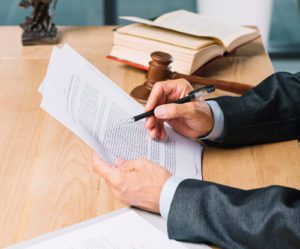 The New Jersey Supreme Court continued: Defendant was charged with permitting or encouraging the release of a confidential child abuse record, a fourth-degree offense, N.J.S.A. 9:6-8.10b; hindering his own apprehension or prosecution by giving a false statement to law enforcement, a disorderly persons offense; and fourth-degree false swearing by inconsistent statements. Defendant filed a motion to dismiss the charge relating to the unlawful release of the confidential documents, arguing that N.J.S.A. 9:6-8.10b did not apply to his conduct. The court denied that motion. After a mistrial and retrial, defendant was convicted of the three offenses.
The New Jersey Supreme Court continued: Defendant was charged with permitting or encouraging the release of a confidential child abuse record, a fourth-degree offense, N.J.S.A. 9:6-8.10b; hindering his own apprehension or prosecution by giving a false statement to law enforcement, a disorderly persons offense; and fourth-degree false swearing by inconsistent statements. Defendant filed a motion to dismiss the charge relating to the unlawful release of the confidential documents, arguing that N.J.S.A. 9:6-8.10b did not apply to his conduct. The court denied that motion. After a mistrial and retrial, defendant was convicted of the three offenses.
Defendant appealed. An Appellate Division panel affirmed defendant’s convictions for hindering and false swearing. 448 N.J. Super. 206, 228 (App. Div. 2017). For the reasons that follow, the panel vacated defendant’s conviction for violating N.J.S.A. 9:6-8.10b and dismissed the indictment for that charge. Ibid.
The panel stressed that, where it is not clear whether something is permitted under a criminal statute, the benefit of this lack of clarity should accrue to the defendant. If an ambiguity in a criminal statute is not resolved by reviewing the text and extrinsic sources, the rule of lenity dictates that the ambiguities must be interpreted in favor of the defendant. (448 N.J. Super. at 217-19.)
Reports of abuse made to the Division and “all information obtained by the Division in investigating such reports” must be kept confidential. N.J.S.A. 9:6-8.10a(a). That information, however, “may be disclosed, but only under the circumstances expressly authorized” by the statute. Ibid. The statute specifies various entities and people to whom disclosure can be made under various conditions. N.J.S.A. 9:6-8.10a(b) to (g). Among them is “a police or other law enforcement agency investigating a report of child abuse or neglect.” N.J.S.A. 9:6-8.10a(b)(2). The statute imposes a duty upon authorized recipients to maintain the confidentiality of the information disclosed to them by the Division. The prohibition against disclosure states: “Any individual, agency, board, court, grand jury, legislative committee, or other entity which receives from the department the records and reports referred to in subsection a., shall keep the records and reports, or parts thereof, confidential and shall not disclose the records and reports or parts thereof except as authorized by law.” N.J.S.A. 9:6-8.10a(b) (emphasis added). The statute, therefore, prohibits the Division or anyone who receives confidential documents in accordance with the statutes from failing to maintain the documents’ confidentiality. (448 N.J. Super. at 219-20.)
The natural counter argument for the prosecution to adopt is that if it would be a crime for someone who lawfully obtained Division documents to disclose them, then it should naturally be a crime for someone who unlawfully obtained the documents to disclose them. An appellate panel and a unanimous New Jersey Supreme Court held otherwise.
